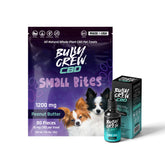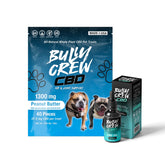Medicinal mushrooms have been part of human medicine for thousands of years, and they can also benefit dogs. Mushrooms for dogs with cancer can boost their immune system, help them handle the side effects of traditional cancer treatments, and fight tumor growth. Recently, medicinal mushrooms have become a hot topic in pet healthcare. While the idea of using mushrooms for dogs with cancer is intriguing, it's essential to understand how they work and how to use them effectively. This blog will explore six of the most common medicinal mushrooms and their cancer-fighting benefits.
What are Medicinal Mushrooms?
Medicinal mushrooms are fungi known for their therapeutic benefits. They are excellent antioxidants and prebiotics and are rich in vitamins and minerals. All medicinal mushrooms can boost the immune system, but each type has unique properties.
These mushrooms for cancer in dogs contain compounds called beta-glucans, which are a type of soluble fiber present in many plants, bacteria, and fungi. The beta-glucans in mushrooms are especially potent and have strong medicinal properties.
Medicinal Mushrooms For Dog Cancer

Medicinal mushrooms for dogs with cancer are an increasingly popular topic of interest. Research shows that these mushrooms can fight cancer cells without harming the other parts of the body, unlike treatments like chemotherapy and radiation that damage healthy cells while targeting cancerous ones. Mushrooms have the unique ability to destroy cancer cells while sparing healthy ones. They can also be safely used alongside conventional therapies like chemo or radiation, enhancing their effectiveness and lowering the risk of cancer recurrence.
The adaptogenic and immune-modulating properties of medicinal mushrooms make them beneficial for dogs with cancer. However, some mushrooms are particularly effective at targeting specific types of cancer.
1. Turkey Tail Mushrooms for cancer in dogs

Turkey Tail, also known as Coriolus or Trametes versicolor, is the most researched medicinal mushroom for cancer in dogs. It offers significant health benefits, particularly its ability to combat cancer. Unlike many other mushrooms studied only in lab settings, Turkey Tail has been tested on living organisms, showing promising results in halting tumor growth. The key compound, Coriolus Versicolor Polysaccharide (CVP), is known for its anti-tumor properties. Studies have demonstrated its effectiveness in promoting programmed cell death in liver cancer cells and other cancer types.
Research indicates that integrating Turkey Tail mushroom extracts with conventional cancer treatments enhances treatment success and survival rates. This synergy has been observed in both human and canine cancer patients undergoing chemotherapy and radiation. Turkey Tail supports the immune system, helping to alleviate chemotherapy's side effects while boosting its efficacy against cancer cells. Turkey Tail is a valuable adjunct therapy for pets and people battling cancer, offering hope and support alongside conventional treatments.
2. Reishi Mushrooms for cancer in dogs

Reishi mushrooms, scientifically known as Ganoderma lucidum, along with related mushrooms like Artist Conk, provide numerous benefits, such as stress relief, calming the nervous system, and improving sleep quality. These mushroom for dogs are particularly noted for their potent anti-cancer properties, which have been extensively studied and are beneficial for dogs battling cancer.
Thanks to the triterpenes found in Reishi, these mushrooms exhibit immunomodulatory solid and anti-tumor effects. Research shows that the polysaccharides in Reishi also contribute to its anti-tumor properties, effectively shrinking and preventing cancerous growth. Additionally, Reishi mushrooms are known to inhibit the spread of original cancer cells, reducing the risk of secondary cancers. This makes Reishi one of the vital dog cancer mushrooms that potentially slow its progression.
Similar to Turkey Tail mushrooms, Reishi can help dogs tolerate chemotherapy more effectively. Studies from The Tang Center for Herbal Medicine Research suggest that Reishi mushrooms have properties that mitigate drug-induced side effects like nausea and vomiting.Incorporating Reishi mushrooms into your dog's daily routine can support their immune system and potentially reduce cancer risks. These mushrooms offer significant health benefits for your beloved pet, promoting overall well-being and vitality.
3. Lion's Mane Mushrooms for cancer in dogs

Lion's Mane Mushroom, scientifically known as Hericium erinaceus, is recognized for supporting the nervous system and addressing issues like cognitive deficits, brain fog, and depression. In addition to its neurological benefits, this mushroom shows promise in combating cancer by promoting apoptosis, a process that eliminates abnormal cells with cancerous potential. These qualities make Lion's Mane a hopeful addition to cancer treatments for dogs.
One of Lion's Mane's active compounds, Cerebroside E, has been extensively studied for its role in enhancing cancer cell apoptosis. Ongoing research suggests it may be particularly effective against specific types of cancer. Studies indicate that Lion's Mane polysaccharide complexes can disrupt specific cellular processes and inhibit the further division of colon cancer cells. As research continues, Lion's Mane Mushroom remains a subject of interest among scientists and pet owners alike for its diverse health benefits and potential in cancer therapy.
Research into Lion's Mane mushrooms has shown promising results in combating various types of cancer, including leukemia and breast cancer. Early-stage studies suggest that extracts from Lion's Mane can induce apoptosis, or cell death, in leukemia cells in laboratory settings. Recent research has also explored the effects of Lion's Mane extracts on estrogen receptor-positive (ER+) human breast cancer cells, showing potential in reducing these cancer cells. These findings highlight Lion's Mane as a promising area for further cancer research and potential therapeutic applications as mushroom for dog cancer.
4. Cordyceps Mushrooms for cancer in dogs

Cordyceps mushroom, known scientifically as Ophiocordyceps sinensis, is a unique fungus with multiple health benefits beyond its reputation for enhancing exercise performance and heart health. Research highlights its potential in combating cancer due to its anti-inflammatory, anti-cancer, and anti-tumor properties. Studies have explored how cordyceps mushroom promotes autophagy and apoptosis in colon and cervical cancer cells, inhibits blood vessel formation (angiogenesis), and induces apoptosis in malignant melanoma. Additionally, cordyceps has a history of use in respiratory health, dating back to ancient times, suggesting potential benefits for lung cancer patients. For those with Non-Small Cell Lung Cancer, cordyceps has been observed to increase levels of P53 and P21, crucial genes involved in regulating cell division and growth.
5. Chaga Mushrooms for cancer in dogs
Chaga mushroom (Inonotus obliquus) shares the spotlight with Turkey Tail for its impressive anti-cancer properties. Research highlights Chaga's ability to combat various cancers, particularly digestive cancers such as colon and gastric cancer. Scientists have identified compounds in Chaga that inhibit pathways crucial for cancer cell development. Additionally, studies show Chaga's potential to induce apoptosis, or cell death, in liver cancer cells through similar mechanisms as those seen in colon cancer.
Chaga Mushrooms and Bladder Cancer in Dogs
Studies have shown promising results regarding Chaga mushrooms for treating bladder cancer in dogs. Studies using dog bladder cancer organoids (DBCO) revealed that Chaga extract can inhibit cancer cell growth, trigger cell death, and halt cell division in a dose-dependent manner. It also lowered the presence of markers associated with bladder cancer stem cells and suppressed signals linked to cancer cell proliferation.
Moreover, when combined with traditional anti-cancer medications, Chaga demonstrated enhanced efficacy. Animal trials further demonstrated that administering Chaga resulted in reduced tumor size and weight, suggesting its potential therapeutic benefits. These findings underscore Chaga mushrooms as a natural supplement that could complement standard chemotherapy treatments, reduce side effects, and potentially prevent cancer recurrence and spread in dogs with bladder cancer.
6. Maitake Mushrooms for cancer in dogs

Maitake is a lesser-known mushroom in cancer management. It has been used in Asia for a long time and is gaining popularity in the US. It acts as a potent adaptogen and immunomodulator for dogs. Maitake offers anti-tumor, anti-cancer, and antioxidant benefits like other medicinal mushrooms for canine cancer.
Research indicates that Maitake mushroom inhibits cancer cell growth and boosts the body's production of cancer-fighting cells. Despite its lesser-known status, its benefits are equally potent compared to other medicinal mushrooms, making it an invaluable addition to your dog's treatment plan.
How To Choose The Best Mushrooms For Cancer In Dogs
We now know about the powerful cancer-fighting and health-boosting benefits of medicinal mushrooms for dogs with cancer. However, like hemp products, the market is flooded with low-quality offerings that overpromise and underdeliver. Consider these key factors to choose the right product that truly benefits your pet's health.
Firstly, opt for products made solely from fruiting body extracts. The fruiting body, visible above ground, holds the highest medicinal potency. Avoid products that use mycelium (mushroom roots), which offer minimal medicinal benefits and can harbor mold.
Secondly, prioritize liquid extracts over powdered forms. Powders often lack proper processing to fully extract the mushroom's therapeutic properties. Liquid extracts undergo triple extraction, ensuring maximum bioavailability for your pet.
Lastly, the origin of the mushrooms matters significantly. Those grown in natural outdoor environments typically offer stronger and more potent benefits than those cultivated in controlled greenhouse conditions. For optimal quality and effectiveness, seek out products sourced from wild-harvested mushrooms.
Conclusion
Medicinal mushrooms for dogs with cancer are a valuable gift from nature for managing and preventing many health conditions. The mushrooms for dogs' benefits for cancer are remarkable, and ongoing research reveals their holistic healing potential. Though more in-depth pet-specific studies are needed, the positive findings from human research and medical endorsement suggest similar benefits for our pets. We strongly advocate for including medicinal mushrooms in every pet's proactive health routine.








